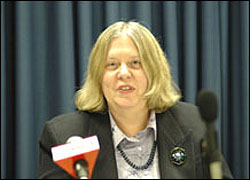
U.S. AMBASSADOR LEAVES BELARUS
Publication: Eurasia Daily Monitor Volume: 5 Issue: 49
By:

A diplomatic dispute between Belarus and the United States reached a new low on March 12, when U.S. Ambassador Karen Stewart was recalled to Washington for talks. Earlier State Department deputy spokesman Tom Casey had declared that the ambassador would remain in Minsk despite the Belarusian government’s strong recommendation that she leave, and following the recall of its ambassador in Washington, Mikhail Khvastou.
The dispute centers on a number of issues: first, sanctions imposed on the consortium Belnaftakhim and U.S. insistence that Belarus must release all political prisoners – specifically Alyaksandr Kazulin – before relations can be normalized. Second, according to Belarusian President Alyaksandr Lukashenka, a related issue is the launching of a Belarus-Venezuela venture that will allow both countries to obtain oil from the Guara Este field in the South American country. Lastly, the Belarusian side appears also to be trying to create a rift between the United States and its close allies in the European Union, according to a Russian source. A brief chronology of these events is in order.
On November 13, 2007, the United States announced that it was imposing sanctions on Belnaftakhim, one of Belarus’s largest petrochemical companies. Two days later, Ambassador Stewart was requested to visit the Belarusian Foreign Ministry, where she received a demand that the United States must unfreeze immediately all of the company’s U.S. assets. On December 13, Ambassador Stewart warned that further sanctions could be imposed if the internal situation in Belarus did not improve. The statement evidently infuriated Lukashenka, who used a December 30 speech during a visit to an SOS Children’s Sanatorium in Barauliany to declare that the Belarusian side would respond strongly to any further steps by requesting that the U.S. ambassador leave the country. Ten days earlier, Belnaftakhim had announced that the export of its oil products, chemical, and techno-chemical goods would be switched from the U.S. dollar to the Euro.
Following the release of several political prisoners by Belarus earlier this year, relations with both the EU and the United States improved, but the Belarusian side’s refusal to release the last prisoner so designated – Kazulin, who had been allowed to attend his wife’s funeral on February 26 – led to the new impasse (see EDM, February 28). Belarusian Minister of Internal Affairs Uladzimir Navumau stated at a press conference on March 3 that there was no basis for Kazulin’s release because an amnesty was dependent on a prisoner’s good behavior, and the former rector of the State University had four “punishments” already, the most recent of which had been incurred in December 2007.
As a result of such intransigence, the United States expanded its sanctions to include all Belarusian petrochemical companies in which the government’s share was 50% or more. In addition to the sanctions, both Washington and the EU imposed a visa ban on prominent Belarusian officials in April 2006, including the president and his chief advisers, which was widened last year. Belarus responded to the heightened sanctions by recalling Ambassador Khvastou on March 7. Initially, the United States ignored the request that Ambassador Stewart should leave Belarus. Evidently the Foreign Ministry requested a second meeting on March 11, after which the ambassador left for Vilnius. The United States has affirmed, however, that it expects her to return once consultations are over.
Belarus insists that the United States is interfering in its internal affairs and violating a Memorandum signed between the two countries in 1994 when Belarus relinquished its nuclear weapons (an agreement in place before Lukashenka was elected president). A Russian analysis maintains that the Belarusians are trying to cause a wedge (klin) between Europe and the United States, citing the president’s statement that “Belarus is a critical transport artery for the European Union…20-25% of natural gas to the EU travels through Belarus, as well as over 100 million tons of oil, or 40% of the oil that Russia supplies to the EU,” and that the two sides are close partners. Belarus has recently appealed to the United Kingdom specifically to become a close trading partner.
Belarus also maintains that the Americans are incensed by its close friendship with Venezuela, which resulted in the launch of a joint oil company last December. About 7 million tons of oil are anticipated to be produced annually; Venezuela will receive 60% and Belarus 40% according to the terms of the agreement.
However, the main issue is Belarus’s refusal to release Kazulin. The authorities are angry at what they perceive as the outspokenness of Ambassador Stewart on this issue. But, as former deputy foreign minister Andrey Sannikau has noted, logically the next move would be to declare the ambassador persona non grata and cease diplomatic relations, and yet this has not happened. Sannikau believes that the Belarusians are fearful of further sanctions that would be taken by the U.S. side.
For all their bluster, the Belarusian authorities are treading carefully. They do not want to release Kazulin, but they wish to take a firm stance against the United States without alienating the EU. The current course of action seems misguided. Ambassador Stewart intends to return shortly, but it is very unlikely that the Belarusian authorities will prevent her from doing so.
(Kommersant, March 11; ww.charter97.org, March 10; Belorusy i Rynok, March 10-17; Belorusskaya Delovaya Gazeta, March 13; International Herald Tribune, March 12; New Europe, November 17, 2007)




